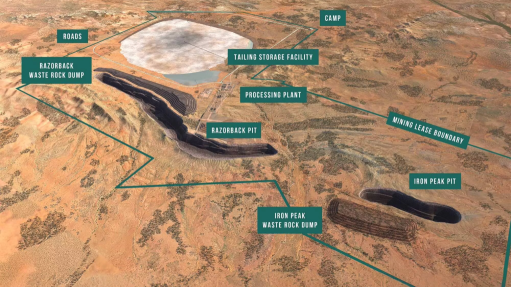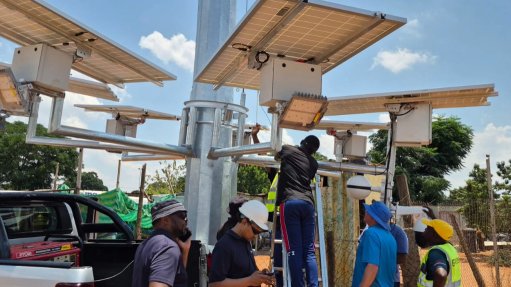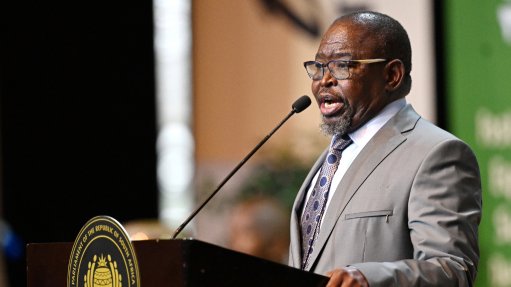Municipalities spend 22% of budget in the first quarter of the 2024/25 financial year
The National Treasury, on December 20, published the local government revenue and expenditure report for the first quarter period from July 1 to September 30, which showed that aggregate spending by municipalities was 21.6%, or R140.4-billion, of the total adopted expenditure budget of R649.9-billion for the financial year ended February 2025.
Aggregated billing and other revenue were 26.4%, or R172.3-billion, of the total adopted revenue budget of R652.3-billion. Capital expenditure amounted to R9.2-billion, or 11.9%, of the adopted capital budget of R77.4-billion.
"This report functions as a management tool that serves as an early warning mechanism for councils, provincial legislatures and municipal management, allowing for effective monitoring and timely improvement of municipal performance," Treasury said in a statement.
The adopted operating expenditure budget amounted to R572.5-billion, of which R131.2-billion, or 22.9%, was spent by September 30.
Municipalities adopted a budget of R162.6-billion for salaries and wages, including remuneration of councillors, which represented a R8.1-billion, or 5.2%, increase from the adopted budget of R154.5-billion for the 2023/24 municipal financial year.
By September 30, R32.8-billion, or 20.2%, of the adopted salary budget was spent, Treasury said.
However, the figures reported by Treasury for operating expenditure on employee-related costs exclude the City of Tshwane as the metro reported an error into the local government database. This skewed all the first quarter figures for the country; hence, a decision was taken to exclude the employee-related costs figures on the statement of financial performance.
"The city has been notified of the error, and Treasury will monitor progress in correction of the error to avoid repetition of the same error going forward."
Further, aggregate municipal consumer debts amounted to R386.5-billion as at September 30, compared with R306.7-billion reported for the first quarter of the 2023/24 financial year. A total amount of R1.3-billion, or 0.3%, has been written off as bad debt.
Government debt accounts for 6%, or R23.2-billion, of the total outstanding debtors by September 30, compared R18.6-billion reported in the first quarter of 2023/24.
The largest component of this debt related to households and represents 71.8%, or R277.6-billion, similar to the 71.9%, or R220.4-billion, reported in the first quarter of the previous financial year.
Additionally, total creditors owed by municipalities were reported at R126.8-billion, which is an increase from R101.4-billion reported in 2023/24.
Provinces with the highest percentage of outstanding municipal creditors in the category greater than 90 days include Free State at 91.5%, Northern Cape at 90%, Mpumalanga at 88.6% and North West at 82%.
"An increase in outstanding creditors could be an indication that municipalities are experiencing liquidity and cash challenges and, consequently, are delaying the settlement of outstanding debt owed, " Treasury noted.
Meanwhile, analysis of the collection rates indicate that, while municipalities have budgeted for an 88.8% collection rate, aggregated actual collection performance against billed is 73.1%.
The metros budgeted for a 92.4% collection rate and collected 71.3%. The secondary cities seem to be performing better than the national and metro average, the budgeted billing was 87.2% and the actual collection was 83.6%, Treasury points out.
At the end of the first quarter, R14.2-billion, or 33.8%, in infrastructure grants had been transferred to municipalities, and R7.4-billion, or 17.7%, was spent, or 52% against the transferred amount.
Further, the best performing infrastructure grants to municipalities during the first quarter were the two grants administered by Department of Cooperative Governance, namely the Municipal Infrastructure Grant, which reported expenditure of 24.5% of its R17-billion budget, and the Integrated Urban Development Grant, which reported expenditure of 21.8% of it R1.1-billion allocation.
The Water Services Infrastructure Grant administered by Department of Water and Sanitation reported expenditure of R781.7-million, or 19.4%, of the R4-billion allocation.
The Integrated National Electrification Programme grant administered by the Department of Mineral Resources and Energy reported expenditure of 16%, and the Neighbourhood Development Partnership Grant administered by Treasury reported expenditure of 116.9%.
The Regional Bulk Infrastructure Grant, which is administered by the Department of Water and Sanitation, reported expenditure of 15.6%, or R599.4-million, against the R3.8-billion allocation.
Additionally, the lowest spending grant under the infrastructure grants during the first quarter is Municipal Disaster Recovery Grant, administered by the Department of Cooperative Governance, which reported expenditure of 0.6% of the allocated R741-million.
"This is concerning, given the grant is to assist municipalities to rehabilitate and reconstruct municipal infrastructure damaged by a disaster to timeously restore functionality of municipal infrastructure following a disaster,” Treasury states.
Further, other poorly performing infrastructure grants were the Public Transport Network Grant, administered by the Department of Transport, which reported expenditure of 9.2% of its allocation, and the Informal Settlements Upgrading Partnership Grant, administered by Department of Human Settlements, which also reported expenditure of 9.2% of its allocation.
Article Enquiry
Email Article
Save Article
Feedback
To advertise email advertising@creamermedia.co.za or click here
Press Office
Announcements
What's On
Subscribe to improve your user experience...
Option 1 (equivalent of R125 a month):
Receive a weekly copy of Creamer Media's Engineering News & Mining Weekly magazine
(print copy for those in South Africa and e-magazine for those outside of South Africa)
Receive daily email newsletters
Access to full search results
Access archive of magazine back copies
Access to Projects in Progress
Access to ONE Research Report of your choice in PDF format
Option 2 (equivalent of R375 a month):
All benefits from Option 1
PLUS
Access to Creamer Media's Research Channel Africa for ALL Research Reports, in PDF format, on various industrial and mining sectors
including Electricity; Water; Energy Transition; Hydrogen; Roads, Rail and Ports; Coal; Gold; Platinum; Battery Metals; etc.
Already a subscriber?
Forgotten your password?
Receive weekly copy of Creamer Media's Engineering News & Mining Weekly magazine (print copy for those in South Africa and e-magazine for those outside of South Africa)
➕
Recieve daily email newsletters
➕
Access to full search results
➕
Access archive of magazine back copies
➕
Access to Projects in Progress
➕
Access to ONE Research Report of your choice in PDF format
RESEARCH CHANNEL AFRICA
R4500 (equivalent of R375 a month)
SUBSCRIBEAll benefits from Option 1
➕
Access to Creamer Media's Research Channel Africa for ALL Research Reports on various industrial and mining sectors, in PDF format, including on:
Electricity
➕
Water
➕
Energy Transition
➕
Hydrogen
➕
Roads, Rail and Ports
➕
Coal
➕
Gold
➕
Platinum
➕
Battery Metals
➕
etc.
Receive all benefits from Option 1 or Option 2 delivered to numerous people at your company
➕
Multiple User names and Passwords for simultaneous log-ins
➕
Intranet integration access to all in your organisation




















